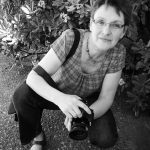Véronique Vercheval

News photographer, professor, activist and feminist, Véronique Vercheval is, by her own admission, a perfect blend of her parents, Jeanne Vervoort, feminist and writer, and Georges Vercheval, photographer, founder and for many years director of the Museum of Photography in Charleroi. She was only 16 when she started photography classes, along with her studies in social sciences. A graduate of the Academy of Fine Arts in Charleroi, she began her career in 1979 as a photojournalist for the magazine Voyelles, where she made numerous reports on the status of women in Belgium (at home, at work, creative women or political).
In 1983, together with her mother, Bernard Bay and Jean-Luc Deru, she founded the Archives de Wallonie, an association of French-speaking photographers, journalists, historians and sociologists committed to safeguarding the traces of human action. In this context, she participated in photographic missions in the world of work in Wallonia with the aim of constituting a collective memory essentially linked to companies, industries and social movements: Les Sidérurgistes (1984), Le Roton, dernier charbonnage de Wallonie (1985), l’Agriculture ou l’histoire photographiée des gens de la terre (1988), or La révolution alimentaire à l’aube du marché européen (1992).
Since 1990, she pursued a career as a freelance photographer and made news reports in Belgium and abroad in the social and cultural sectors. Among the major reports she has produced: Demandeurs d’Asile (1995), a report on the hosting of refugees; Les images libèrent la tête (1997), a series of photos made with the inmates of the prison of Lantin; Les travailleurs de la santé (1998), a portrait of doctors, nurses and physical therapists in their daily activities, questioning our existence and the fate of our bodies; La route à tout prix (2001), a report on the daily life of truck drivers; Palestine. Carnets de notes (2002), on the daily life of Palestinians with and despite the Israeli occupation; or Usine occupée (2008), on the workers of the Royal Boch factory before its liquidation. Alongside these reports, Véronique Vercheval regularly works with theatre and dance companies such as the Théâtre du Manège in Maubeuge, Charleroi /Danses and Plan K. Since 1987, she has been teaching photography at the Institute of Arts and Crafts of La Louvière. She exhibits in Wallonia and Brussels, but also in the Netherlands, Italy and France.
Working exclusively in the format of the series, which are the fruit of a long immersion work within a community or a particular subject, Véronique Vercheval's approach takes on a form of testimony. Far from a purely aesthetic research and refusing any event-oriented or sensationalist approach to the profession of photographer, she likes to go out to meet people and make them "talk through the photographs". When in April 2002 she participated in the mission 100 artists of Palestine, initiated by the Director of the Ashter Theater in Ramallah, she was surprised by what the media did not show: a market organised amongst the rubble, women and their children at the ice-cream parlour, smiling young girls having fun together at their Summer camp ... Véronique Vercheval's approach does not seek visual shock. Her photographs never feature death or physical violence. Far from the media clichés known to the general public, they are surprising because they show what we’re not used to seeing: smiling people, women and children in their daily activities, and not terrorists. Using black and white almost exclusively, she chooses to focus on the essentials her photographs show.
